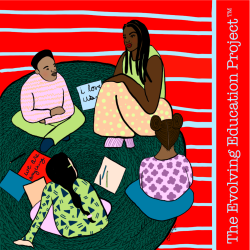Our Beginnings
As a classroom teacher, I (Tiffany M. Nyachae) yearned for conversations and learning spaces that truly centered the Black students I taught. I noticed the tensions that arose as I, and other teachers of Color, spoke out against racist practices experienced by our students. I would often hear my white colleagues say, “It’s a poverty issue, not a race issue,” erasing and silencing our students’ experiences of racism in schools. Dismissive claims like these triggered my own painful memories of racism as a Black girl whose school failed to address the overwhelming racial, linguistic, and cultural tensions among the working-class Black, Latinx, and white student population. I recall how this failure eventually led to a huge lunchroom racial brawl during my sixth-grade year. After sitting through a lecture on why we shouldn’t be racist, I left school that day emotionally wounded and with so many unanswered questions. Had the school unpacked how structural racism effected each of us, perhaps this fight could have been avoided. Still, I wonder if my teachers were even prepared to have had this conversation in honoring ways.
Once I became a teacher myself, I realized that, as teachers, we needed supportive spaces to work through these tensions. But even more, I yearned for spaces where I could learn, be in conversation with justice-centered likeminded people, and where my own intellectual appetite was nourished as I educated others whether in schools or in non-institutionalized educational spaces (e.g., churches, community organizations, etc.). Moreover, I was hungry for the freedom and support to educate in liberatory ways. When I began to educate future and practicing educators of Color, I knew that I was not alone. Many of us longed for the type of community and dialogic learning that I hope The Evolving Education Project will offer.
My desire to create The Evolving Education Project also stems from my own histories and experiences as a child and as a learner. For one, school as a sanctioned educational institution was not the only place that I received an education or that even shaped my practices as an educator. My earliest memory of education is sitting in my Sunday School class at four years old and learning about Bible stories from Sister Annette (who I would later call Mama Nette). We sang songs, recited poems and scriptures, colored, and engaged in enriching literacy events, and critical thinking. Most importantly, Sister Annette’s love and high expectations for us as Black children were very clear. Following her example, as an educator, I aimed to love my students, provide rich intellectual experiences, believe in their greatness, and set high expectations. I was blessed to continue to have strong educators in my religious settings. While schools would label me “average” and “struggling reader,” failing to recognize the knowledge and strengths that I brought into the classroom, I was positioned as highly literate and very capable in out-of-school educational spaces. It is my hope that The Evolving Education Project will cause us to reframe what education is, who is educator, who is learner, and where education happens.
As I continued my education after teaching in the classroom for seven years, I met my tribe or likeminded friends; that is, justice-oriented educators who understood their lifework to go beyond the institutions in which we worked, who had expansive understandings of what constituted education/educator/learning/learner, and people of Color who loved and were invested in children of Color, youth of Color, and other people of Color. Although we enjoyed our work, we were concerned that the voices of the communities that we cared and wrote about were not a part of larger educational conversations. We also wondered how we could use our talents and giftings, fostered by our communities, in non-traditional and accessible ways. Taken together, the creation of The Evolving Education Project was shaped by my racialized experiences as both learner and educator, by being in community with likeminded folx, and by my desire for better educational experiences for children of Color, youth of Color, educators of Color, and people of Color.

Our Dreams

Our Lifework
We center the educational joys, passions, interests, and inquiries of people of Color. We advance loving people of Color just as we are and seeing our stories and knowledge as legitimate and enough. With historically and contextually situated understandings, we respond to the ever-changing times and political needs of particular groups among people of Color by attending to their multiple intersecting identities (e.g., gender, language, sexuality, ability, able-bodiedness, nationality, religion, social class, etc.). We affirm and cultivate the confidence, knowledge, expertise, and educator identities of justice-oriented individuals who are invested in children of Color, youth of Color, and people of Color and who educate in and across a variety of spaces and contexts. We disrupt status quo practices and norms by learning from various members of these groups such as, parent(s), caregivers, tias, tios, abuelas, abuelos, othermothers, big cousins, community workers, teachers, educators, collectives, and coalitions. As we learn with and from people of Color, we co-construct knowledge in ways that honor and revive the knowledge production and knowledge dissemination practices of our ancestors while inspiring transformative work for just futures.

